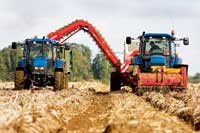British Potato 09: Blackleg risk from imported seed

Potato growers face a greater risk of a new, more aggressive, form of the seed-borne bacterial disease blackleg if they import seed from outside the UK.
That warning was given by SASA‘s Gerry Saddler during a seminar outlining the threat from Dickeya solani, which in less than five years has become the predominant cause of blackleg in some European countries.
Blackleg is the major cause of seed downgrading and rejections in Northern Europe, while the related condition of bacterial soft rot of tubers can result in major production loss for both seed and ware producers.
Those conditions could be caused by three bacterial diseases: Pectobacterium atrosepticum, Pectobacterium carotovorum, and Dickeya, of which there are five species that can infect potatoes, Dr Saddler explained.
Dickeya, which was previously known as Erwinia chrysanthemi, was first reported in Holland in the early 1970s, with subsequent reports from several European countries. Most early findings were Dickeya dianthicola, but in 2005 a new, more aggressive form, Dickeya solani was found in Holland.
That species was now responsible for the majority of blackleg cases in Holland, and was partly to blame for a five-fold increase in annual losses amounting to €25m from the disease.
Those kind of losses were possible in the UK if growers and industry did nothing to prevent the spread of the disease, Dr Saddler warned. Ten cases of Dickeya solani were identified in England and Wales on seed and ware crops in 2009, while two cases were found in ware crops grown from imported seed in Scotland.
“It has never been found on Scottish seed potatoes or ware grown from Scottish origin seed,” he said.
Considering the source of your seed potatoes was therefore important for minimising the risk from the disease, he stressed. “There is no easy way of dressing this up: The risk of Dickeya is higher with imported seed.”
Gerry Saddler’s speech at British Potato 2009
Part one:
Part two:
The hygiene measures outlined in the seed industry’s Safe Haven scheme were important in preventing the disease getting into the Scottish seed sector, Food and Environment Research Agency’s John Elphinstone told Farmers Weekly.
“The worrying part is that it seems only a very low inoculum level is needed to produce an infection.”
He advised growers to arrange a diagnostic test if they suspected Dickeya. “It is difficult to tell the difference visually between the different causes of blackleg.”
Testing would also help track the spread and incidence of the disease, he said. “We have very little information on how widespread it is.”
Aggressive tuber rots
The aggressiveness of the disease was a major concern, Paul Coleman, Greenvale‘s technical director, said. “Some of our growers had bad experiences with Dickeya solani this season, and I think there were more cases than reported, just because growers weren’t aware of what it was.
“The thing that really concerned me was that I had never seen such aggressive tuber rots so early in the crop. We were seeing tubers melting only four to five weeks after tuber initiation.”
In one field where two seed stocks were grown side-by-side, yields of the infected stock were 25% down, he said. “It looked horrendous at full ground cover.”
The Scottish seed industry would benefit if it could be kept disease-free. “We need the voluntary ban in not taking non-Scottish seed into Scotland to be observed,” he stressed.
But last year over 200ha of potatoes were grown from non-Scottish origin seed. “It is a risk to Scottish seed production,” he warned.
How the Safe Haven scheme could help – more VIDEOS
Industry experts were keen to stress how the Safe Haven assurance scheme for seed potato growers could help keep Dickeya solani out of UK seed production at British Potato 2009. The scheme, originally set up to combat ring rot, has strict hygiene standards that should prevent the introduction and spread of Dickeya solani if followed.
Mark Prentice speaks about the dangers of Dickeya
Graham Nichols on the benefits of the Safe Haven scheme
Safe Haven adviser John Elphinstone
Agrimarc’s Nigel Allam on the importance of Safe Haven

